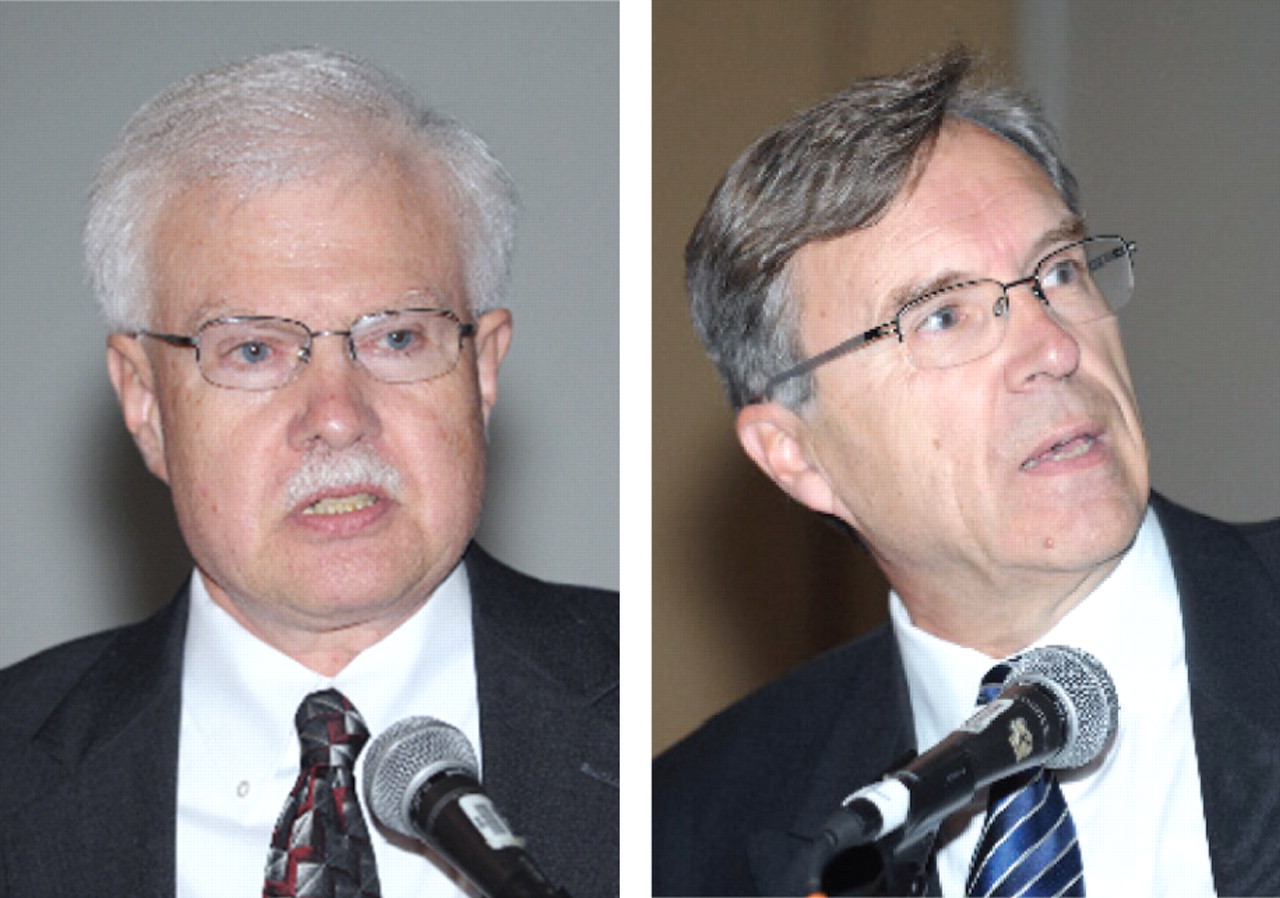Countries Take Diverse Approach to Psychopathic Defendants
“There is a clear-cut difference between mental disorders and psychopathic disorders in German law and forensic psychiatry,” said Henning Sass, M.D., at the 2009 APA annual meeting in San Francisco in May.“ The concept of responsibility must be kept close to psychopathology or there is a danger of extending the concept of irresponsibility too far.”
Responsibility is not just a matter of science but also of society's values and what it will tolerate, said Sass, medical director and chair of the board of directors at University Hospital of the University of Technology in Aachen/Aix-la-Chapelle, Germany.

Neither German nor U.S. law considers psychopathology an argument for diminished responsibility in criminal cases, said both Henning Sass, M.D., (left) of the University of Technology in Aachen, Germany, and Alan Felthous, M.D., of St. Louis University in St. Louis, Mo. The two shared the Manfred S. Guttmacher Award for co-editing the International Handbook on Psychopathic Disorders and the Law.
Credit: Ellen Dallager
Sass was awarded the Manfred S. Guttmacher Award jointly with Alan Felthous, M.D., director of forensic psychiatry and a professor in the Department of Neurology and Psychiatry at St. Louis University. The award is given jointly by APA and the American Academy of Psychiatry and the Law for an outstanding contribution to forensic psychiatry literature.
Sass and Felthous discussed the issue of psychopathic disorders and criminal responsibility in a combined lecture at the annual meeting.
Sass observed that while there were many universal aspects of forensic psychiatry, there were also distinctive national patterns. In Germany, the psychiatric expert is appointed and paid for by the court or the public prosecutor but serves as a neutral expert. He or she is neither for nor against one party in a legal proceeding, and everything the expert discovers or determines is reported in court, whether it favors the defense or prosecution arguments.
The accused are deemed to have a lower level of responsibility if they are diagnosed with psychosis, mental retardation, a severe disturbance of consciousness, or some other mental abnormality, said Sass. He pointed out that these were legal and not psychiatric terms.
Factors weighing against the assumption of diminished responsibility include evidence of calculation, preparation for the crime, controlling the criminal activity, or having the capacity to choose other behavior. Psychopathology is not considered an argument for diminished responsibility.
Criminal responsibility in the United States' judicial system begins with normative public-policy standards, which are sometimes said to be shaped by popular folk psychology, said Felthous.
“There's some truth in that, in actuality, but it's not good enough,” he said. “These standards should be informed by science, but science shouldn't determine the policy. Other interests must be weighed and considered, and cannot be resolved by science.”
In U.S. law, psychopathic disorders and personality disorders are not considered mitigating, he said.
In both Germany and the United States defendants with psychopathic disorders are not involuntarily committed for treatment. For one thing, studies on the effectiveness of treatment for these individuals are inconclusive, so commitment would be unlikely to benefit either the patient or public safety. Also, commitment would medicalize a problem that should be dealt with by the criminal justice system, Felthous noted.
“It is easy to overgeneralize, however,” said Felthous.“ We must think about subtypes of psychopathic disorders, treatable comorbidities, and the role of aggression.”
He noted four types of aggression: impulsive, which combines emotion without thought; spontaneous, with neither emotion nor thought; compulsive, performed with both thought and emotion; and premeditated, involving thought without emotion. The last of these is most closely associated with psychopathy, he said.
What can be done with such defendants?
“We should exclude psychopathic disorders both as a reason for long-term civil commitment and as a mental disorder for the insanity defense,” he said.
More research is needed into the origins and treatment of psychopathic disorders and into ways to prevent them.
“Psychopathic disorders are universal, but each country has its own history and legal principles” regarding how the disorders are addressed in the legal system, he concluded. “So it would help to compare different approaches and thus provide a broader perspective as we grapple with the question of what to do with [defendants who have] psychopathic disorders.” ▪



